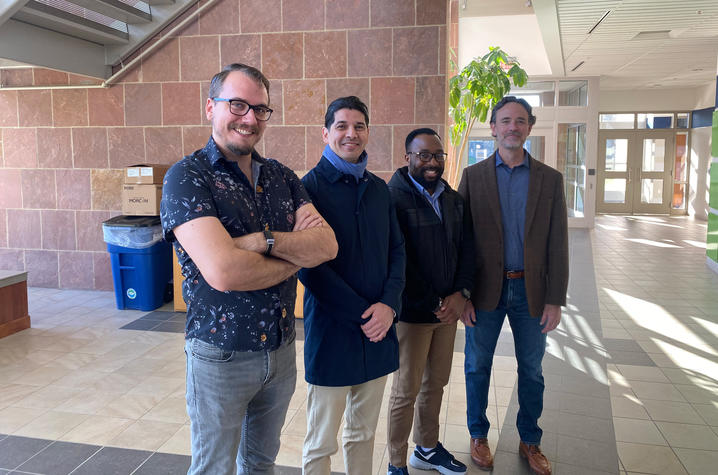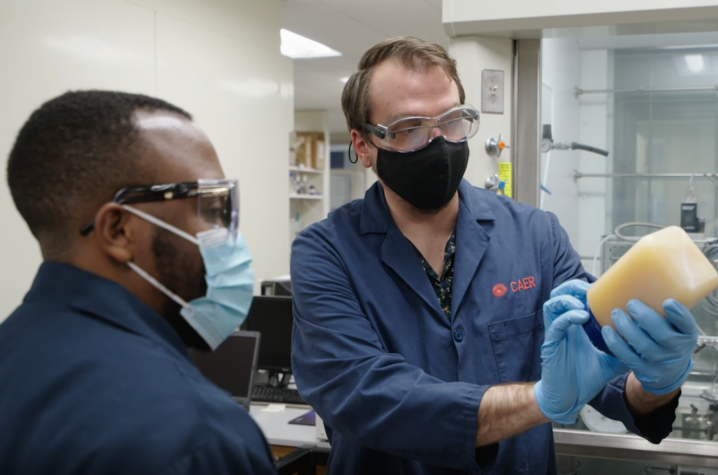CAER, chemistry researchers awarded US Department of Energy grant to develop biofuel technology
LEXINGTON, Ky. (Jan. 9, 2024) — Researchers at the University of Kentucky Center for Applied Energy Research (CAER) and the Department of Chemistry have received a $1 million grant from the U.S. Department of Energy (DOE) to advance their innovative biofuels research.
The project is titled “Robust Engineered Catalysts for the Conversion of Waste Oleaginous Biomass Feedstocks to Fuel-like Hydrocarbons via Decarboxylation/Decarbonylation” and is funded by DOE’s Office of Energy Efficiency & Renewable Energy (EERE).
As part of the project, CAER will partner with Clariant Corp., Saola Energy and the National Renewable Energy Laboratory (NREL), to develop a robust engineered decarboxylation/decarbonylation (deCOx) catalyst.
Successful development of such a catalyst is a critical step in the scale-up of novel deCOx technology to produce renewable fuels from waste biomass feedstocks, or organic materials considered waste or byproducts.
“We believe this technology may provide an industrially-viable alternative to the production of renewable diesel that can compete with — or even improve on the economics and greenhouse gas reduction potential of — more commercially mature pathways,” said Eduardo Santillan-Jimenez, Ph.D., associate director of CAER’s Sustainable & Alternative Fuels (SAF) group, adjunct assistant professor of chemistry in the College of Arts and Sciences and the project’s principal investigator.
In addition to developing an engineered catalyst, CAER researchers will test the latter in a continuous reactor as well as characterize the fresh, spent and regenerated catalyst to gain insights into its deactivation mechanism(s) and inform computational work. To this end, CAER’s SAF group will collaborate with Chad Risko, Ph.D., a computational chemist in the UK College of Arts and Sciences' Department of Chemistry who also conducts his research at the center.
“Leveraging the computational strengths of Dr. Risko’s laboratory is key to the successful development of an engineered catalyst,” said Santillan-Jimenez. “We take pride in being the catalysis experts in our lab, but our partnership with the Risko lab adds computational chemistry expertise that greatly expands our capabilities and impact.”
CAER’s SAF group has a long history of working with catalysts to give new life to waste biomass feedstocks. The group has pioneered a catalyst capable of transforming waste fats, oils and greases into liquid transportation fuels, including both renewable diesel and sustainable aviation fuel.
In this project, CAER will be utilizing brown grease, which is an abundant and inexpensive waste stream that is currently incinerated or landfilled, leading to greenhouse gas emissions.
“No one wants brown grease,” said Robby Pace, a CAER researcher and co-investigator on the project. “But if we could take that waste stream and develop a novel way to put it to good use in the form of renewable diesel, that could have a positive impact on our environment and, hopefully, Kentucky’s economy.”
This material is based upon work supported by the Department of Energy under Award Number DE-EE0010447. This report was prepared as an account of work sponsored by an agency of the United States Government. Neither the United States Government nor any agency thereof, nor any of their employees, makes any warranty, express or implied, or assumes any legal liability or responsibility for the accuracy, completeness, or usefulness of any information, apparatus, product, or process disclosed, or represents that its use would not infringe privately owned rights. Reference herein to any specific commercial product, process, or service by trade name, trademark, manufacturer, or otherwise does not necessarily constitute or imply its endorsement, recommendation, or favoring by the United States Government or any agency thereof. The views and opinions of authors expressed herein do not necessarily state or reflect those of the United States Government or any agency thereof.
As the state’s flagship, land-grant institution, the University of Kentucky exists to advance the Commonwealth. We do that by preparing the next generation of leaders — placing students at the heart of everything we do — and transforming the lives of Kentuckians through education, research and creative work, service and health care. We pride ourselves on being a catalyst for breakthroughs and a force for healing, a place where ingenuity unfolds. It's all made possible by our people — visionaries, disruptors and pioneers — who make up 200 academic programs, a $476.5 million research and development enterprise and a world-class medical center, all on one campus.






